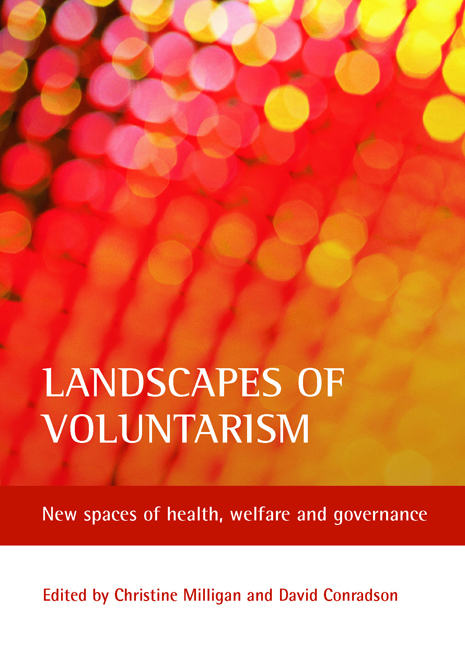Book contents
- Frontmatter
- Contents
- List of tables, figures, maps and plates
- Notes on contributors
- Foreword: Beyond the shadow state?
- one Contemporary landscapes of welfare: the ‘voluntary turn’?
- two A ‘new institutional fix’? The ‘community turn’ and the changing role of the voluntary sector
- three Renewal or relocation? Social welfare, voluntarism and the city
- four Voluntarism and new forms of governance in rural communities
- five New times, new relationships: mental health, primary care and public health in New Zealand
- six Informal and voluntary care in Canada: caught in the Act?
- seven Competition, adaptation and resistance: (re)forming health organisations in New Zealand’s third sector
- eight The difference of voluntarism: the place of voluntary sector care homes for older Jewish people in the United Kingdom
- nine Values, practices and strategic divestment: Christian social service organisations in New Zealand
- ten Faith-based organisations and welfare provision in Northern Ireland and North America: whose agenda?
- eleven Government restructuring and settlement agencies in Vancouver: bringing advocacy back in
- twelve Developing voluntary community spaces and Ethnicity in Sydney, Australia
- thirteen The voluntary spaces of charity shops: workplaces or domestic spaces?
- fourteen The changing landscape of voluntary sector counselling in Scotland
- fifteen Volunteering, geography and welfare: a multilevel investigation of geographical variations in voluntary action
- sixteen Reflections on landscapes of voluntarism
- Index
eight - The difference of voluntarism: the place of voluntary sector care homes for older Jewish people in the United Kingdom
Published online by Cambridge University Press: 15 January 2022
- Frontmatter
- Contents
- List of tables, figures, maps and plates
- Notes on contributors
- Foreword: Beyond the shadow state?
- one Contemporary landscapes of welfare: the ‘voluntary turn’?
- two A ‘new institutional fix’? The ‘community turn’ and the changing role of the voluntary sector
- three Renewal or relocation? Social welfare, voluntarism and the city
- four Voluntarism and new forms of governance in rural communities
- five New times, new relationships: mental health, primary care and public health in New Zealand
- six Informal and voluntary care in Canada: caught in the Act?
- seven Competition, adaptation and resistance: (re)forming health organisations in New Zealand’s third sector
- eight The difference of voluntarism: the place of voluntary sector care homes for older Jewish people in the United Kingdom
- nine Values, practices and strategic divestment: Christian social service organisations in New Zealand
- ten Faith-based organisations and welfare provision in Northern Ireland and North America: whose agenda?
- eleven Government restructuring and settlement agencies in Vancouver: bringing advocacy back in
- twelve Developing voluntary community spaces and Ethnicity in Sydney, Australia
- thirteen The voluntary spaces of charity shops: workplaces or domestic spaces?
- fourteen The changing landscape of voluntary sector counselling in Scotland
- fifteen Volunteering, geography and welfare: a multilevel investigation of geographical variations in voluntary action
- sixteen Reflections on landscapes of voluntarism
- Index
Summary
Introduction
This chapter considers the difference that voluntary sector organisations can make to the lived environments of older people in long-term institutional care. It does so through an analysis of care homes provided by the UK Jewish voluntary sector. It discusses how these institutions can create a greater sense of home than is possible in many private facilities because of the involvement of local communities and volunteers and the sense of ownership, safety and belonging of residents and families. Nonetheless, given increasing regulatory requirements and the financial realities of providing services in a highly competitive long-term care market, the chapter considers what extra dimensions the voluntary sector can still offer to highly vulnerable older people.
The UK Jewish community is used as a case study for two reasons. Firstly, the community can be said to be at the vanguard of British demographic trends. Both nationally and across the Organisation for Economic Co-operation and Development (OECD), not only is the proportion of older people relative to those of younger age increasing, but they are also living longer. While some 16% of the overall UK population is aged 65 or over, 23% of UK Jews are in this age cohort. The proportion of Jews aged 75 or over is also twice that of the UK as a whole (14% as compared with 7%). British Jewish women have a life expectancy that is two years longer than the UK average, and for men the figure is four years (Miller et al, 1996; Schmool and Cohen, 1998). In this sense, the Jewish population in Britain can be seen as ‘demographic pioneers’ (Valins, 2002).
Secondly, the community has a long history of voluntarism and, specifically, of providing long-term residential and nursing care home provision for older people. Indeed, some of the major Jewish social service agencies and care institutions date back to Victorian times (Alderman, 1992). Although the community (like many others) is finding it increasingly difficult to recruit volunteers, it also has reserves of social capital that can provide human and financial support in ways that other ethnic communities may find far harder to develop (see Patel, 1999). Hence, if the Jewish community is unable to make a real difference to the lives of its frail older people, then the prognosis for other voluntary sector ethnic or faith-based communities seeking to establish such provision would be even poorer.
- Type
- Chapter
- Information
- Landscapes of VoluntarismNew Spaces of Health, Welfare and Governance, pp. 135 - 152Publisher: Bristol University PressPrint publication year: 2006



